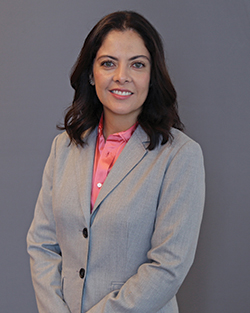Born and raised in Mexico City, Monica Martinez Wilhelmus believes her story is common among Latin communities: She comes from a family that values a strong work ethic and insists on hard work. “My parents were very strict about us being good students and being mindful of the opportunities that were given to us,” she said. “My parents always mentioned that the one thing they would leave us with is an education. They invested their time and efforts into that.”
 Martinez Wilhelmus studied at the Universidad Nacional Autónoma de México (UNAM), earning her undergraduate degree in 2010 in mechanical engineering. “It was a great experience, but it was a difficult environment to navigate,” she said. “There were only two women at that time in my class and I could never find the other one. Nonetheless, I am very grateful for receiving such a good education. Near the end of my degree, I did an exchange semester at the Technische Universitaet Muenchen (TUM), which was eye-opening. It was impressive to see that my undergrad at UNAM was comparable to what you would get at top universities outside of Mexico.”
Martinez Wilhelmus studied at the Universidad Nacional Autónoma de México (UNAM), earning her undergraduate degree in 2010 in mechanical engineering. “It was a great experience, but it was a difficult environment to navigate,” she said. “There were only two women at that time in my class and I could never find the other one. Nonetheless, I am very grateful for receiving such a good education. Near the end of my degree, I did an exchange semester at the Technische Universitaet Muenchen (TUM), which was eye-opening. It was impressive to see that my undergrad at UNAM was comparable to what you would get at top universities outside of Mexico.”
Yet, for all its academic rigor and rank, it was top of mind for Martinez Wilhelmus to look for opportunities abroad when it was time to further her education. “I was fascinated with the work from (CalTech professor) John Dabiri, the idea of learning from nature and implementing key design principles into engineering systems was very inspiring. I went to join his group right after undergrad to pursue my Ph.D. at CalTech.
“After CalTech (where she earned her Ph.D. in 2016), I considered returning to Mexico as a way to give back. I had this amazing education, but evaluating the options, it was really hard. The amount of resources for research in Mexico are slim, which made it a really difficult choice. That’s why UCR was a really great alternative,” Martinez Wilhelmus said, referencing her first assistant professorship at the University of California Riverside.
“UCR has a large Hispanic community and the UC system is in many aspects similar to the system at UNAM. In that sense, I felt like I was giving back to my people without going back to my country. And also when I visited their campus, it was just so open. There was a comfort there, so I felt really happy to be part of that community.”
In early 2020, the challenges of the pandemic and new motherhood inspired Martinez Wilhelmus to reflect on her professional trajectory and goals. “I looked back and I thought, ‘What do I want to do next?’ I wanted to come to a place that allowed me to have a platform to build something lasting, something that would have an impact. Brown was perfect for that,” she said.
Since her arrival on College Hill, Martinez Wilhelmus has been actively recruiting undergraduate and graduate students along with postdoctoral scholars, thereby putting together an interdisciplinary group inspired to make tangible contributions on relevant problems. “I think that’s motivating, particularly to undergrads,” she said. “Our research will help structure the next generation of climate models. The work we do has to do with some of the most concerning problems of our time. The type of lab that I’m creating is a big group of young people that are excited and motivated toward that goal, and I think now is a great time for people to join. We’re all starting out hungry. We have projects, but want more. When we have group meetings, the mood and atmosphere feel limitless. In comparison to an established lab, we’re still in the creating, expanding, and exploring phases where there is room for creativity.”